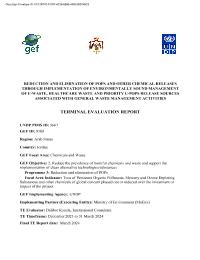
Final Project Evaluation – Reduction and Elimination of Persistent Organic Pollutants
Output 1.1 The 2030 Agenda, Paris Agreement and other intergovernmentally-agreed frameworks integrated in national and local development plans, measures to accelerate progress put in place, and budgets and progress assessed using data-driven solutions
Output 3.1 Institutional systems to manage multi-dimensional risks and shocks strengthened at regional, national and sub-national levels
Output 5.2 Transition to renewable energy accelerated capitalizing on technological gains, clean energy innovations and new financing mechanisms to support green recovery
Goal 1. End poverty in all its forms everywhere
Goal 3. Ensure healthy lives and promote well-being for all at all ages
Goal 12. Ensure sustainable consumption and production patterns
Goal 13. Take urgent action to combat climate change and its impacts
Goal 16. Promote peaceful and inclusive societies for sustainable development, provide access to justice for all and build effective, accountable and inclusive institutions at all levels
1.2 By 2030, reduce at least by half the proportion of men, women and children of all ages living in poverty in all its dimensions according to national definitions
3.3 By 2030, end the epidemics of AIDS, tuberculosis, malaria and neglected tropical diseases and combat hepatitis, water-borne diseases and other communicable diseases
12.4 By 2020, achieve the environmentally sound management of chemicals and all wastes throughout their life cycle, in accordance with agreed international frameworks, and significantly reduce their release to air, water and soil in order to minimize their adverse impacts on human health and the environment
13.1 Strengthen resilience and adaptive capacity to climate-related hazards and natural disasters in all countries
13.2 Integrate climate change measures into national policies, strategies and planning
16.6 Develop effective, accountable and transparent institutions at all levels
1: Governance
2: Poverty


